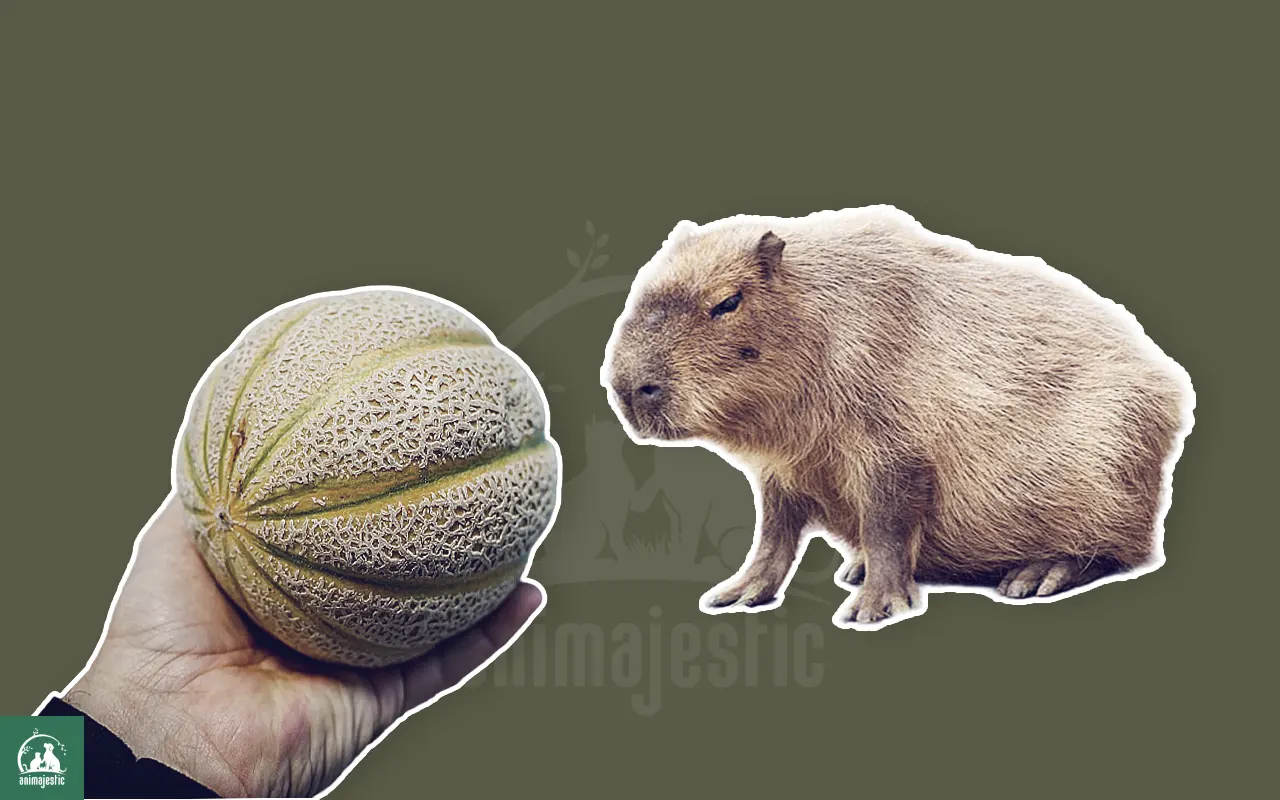The capybara, the world’s largest rodent, captures hearts with its serene presence, inciting curiosity and fascination.
One might wonder, “What do capybaras eat?” More specifically, for all of us consumed by the fruit of knowledge, “Can capybaras eat melons?”
While it may appear as a simple question, the answer requires a thorough understanding of capybaras and their dietary needs, as well as the nutritional intricacies of a melon.
It’s time to uncover the mystery and descend into this unique question.
Eating Habits of Capybaras
Before understanding the place of melons in a capybara’s diet, it becomes important to understand what these giant rodents generally feast upon.
Here’s a summary of what capybara food typically encompasses:
- Plant-Based Diet: Capybaras, being natural herbivores, indulge in diets heavily inclined towards vegetation.
- Grassy Favorites: Their primary food comes from grasses, complemented by aquatic plants, fruits, and veggies when available.
- Water-Lovers: They consume a lot of water and require constant access to a fresh source due to their semi-aquatic nature.
With this understanding of a capybara’s dietary preferences in order, let’s move our focus to the delicious center of this narrative – the melon.
Melons: The Nutritional Allure
A summer’s delight, a slice of melon opens up a world of freshness, packed with nutrients and hydration. Check out the primary components of a melon:
- Hydration Haven: Melons are predominantly water, making them an excellent choice for staying hydrated, as they contain around 90% water.
- Natural Sweetness: Melons have a naturally sweet flavor due to their sugar content, which makes up about 6% of the fruit.
- Fibre Content: A 100g serving of melon offers approximately 0.9g of dietary fiber, contributing to daily fiber intake.
- Vitamin & Mineral: Melons are rich in Vitamins A and C, and they also contain moderate amounts of potassium and B vitamins, making them a nutritious choice.
With the dietary habits of capybaras and the nutritional makeup of melons at our fingertips, we can now examine the crucial question.
Can Capybaras Eat Melons?
Capybaras can indeed eat melons! Our plant-loving friends find this fruit to be highly palatable and nutritious, as it comes packed with hydration and a host of health-enhancing vitamins and minerals.
Of course, as with any other food, it’s essential to maintain balanced portions and ensure that melons don’t replace their primary diet of grasses.
Pros and Cons of Melons in Capybara’s Diet
Including a new food item in your capybara’s diet, such as melons, can come with a range of pros and cons. Let’s dice them up one by one.
Potential Upsides
Melons can be an excellent addition to capybaras’ diets due to the following possibilities:
- Hydration Balance: The high water content in melons can help to keep your capybaras well hydrated.
- Vitamin Rich: The presence of vitamins like A and C can bolster your capybara’s immunity and health.
- Taste Variation: The juicy and sweet nature of the melon can be a pleasant change for capybaras, serving as an occasional treat.
Potential Downsides
Before you jump ahead with joy, there are a few potential drawbacks to feeding capybaras melons:
- Sugar Levels: The high sugar content of melons could potentially lead to weight gain and other health issues if fed in large amounts.
- Portion Control: There’s a risk that capybaras could end up favoring the sweet treat over their staple diet of grass, causing a nutritional imbalance.
Guidelines for Feeding Melons to Capybaras
While not a common part of a capybara’s diet, melons, when introduced correctly and in moderation, can be a delightful treat.
Here’s what to consider when feeding melons:
- Trial Approach: Start by offering a small piece and observe your capybara for any potential reactions or changes in behavior.
- Treat Status: Maintain melons as an occasional treat rather than a staple in their diet.
- Monitor Reaction: Keep a watchful eye on your capybara’s reaction to the introduction of melon in its diet.
Fruit is always a good source of nutrition but should not replace the crucial elements of a capybara’s primary diet.
Alternatives to Melons
While melons can serve as a refreshing treat for capybaras, introducing a variety of plant-based foods is key to maintaining their health and happiness:
- Green Veggies: Dark leafy greens offer an excellent source of vitamins and minerals.
- Other Fruits: Apples, pears, and berries can also serve as occasional treats.
Maintaining a Balanced Diet for Your Capybara
Capybaras require a diet filled with variety and healthy choices, just like us. Here are a few guidelines to keep in mind while caring for your pet’s dietary needs:
- Plant-Based Perks: Grass and other vegetation should form the bulk of your capybara’s diet.
- Treasure Hydration: Make sure they have constant access to fresh, clean water.
- Take it sweet but slow: Foods rich in sugar, including melons, should only be given sparingly.
- Monitor the Menu: Regularly monitor their food and behavior for any changes and consult a vet when in doubt.
Conclusion
Can capybaras eat melons? The answer is yes, but moderation is key. Melons can complement their primarily grass-based diet.
As a responsible pet parent, your role is to guide them toward balanced nutrition, offering occasional treats like melons with love and care, and strengthening your bond with these cute creatures.
